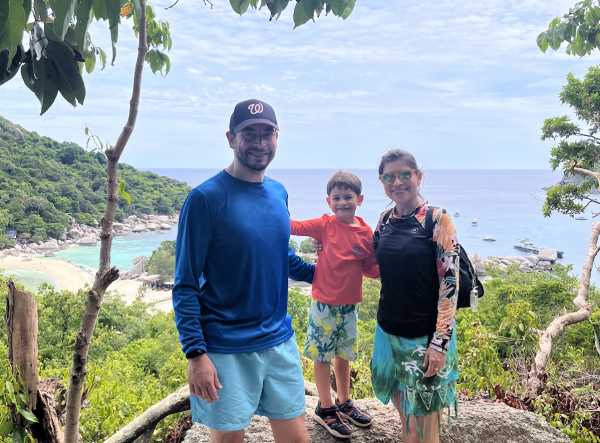Exploring the Intersection of Family and Global Awareness in Thailand
Published 01/23/2024 in Scholar Travel Stipend
Written
by Marcela Correa |
01/23/2024

For our little family of three, travel is a valuable component of a meaningful life. Beyond adventure, entertainment, and unforgettable experiences, our journeys are a lens through which we examine global issues.
Thailand is the fourth country in Southeast Asia that we have visited together, and this trip helped consolidate our understanding of historical and current regional dynamics. In Myanmar and Cambodia, we learned about the historical influence of India and China, while in Vietnam our tours focused on modern history and geopolitics. Our first days in Bangkok were day trips to ancient sites Lopburi and Ayutthaya, where we witnessed the remnants of powerful cities taken over and destroyed by foreign invasions from the Burmese (Myanmar) and the Khmer (Cambodia). The tides of power and migration have shifted throughout the centuries and the days of glory for the Burmese and Khmer have long passed, as the two countries rank lowest in the region in terms of GDP per capita. Thailand’s current role as a regional powerhouse was evident as we encountered immigrants from neighboring countries filling roles in the hospitality industry. In our other travels in Southeast Asia, conversations with locals often shifted to discussions about the appeal of the United States and its opportunities, likely because we are American. In Thailand, it was evident that it was viewed as a locus of opportunity by the citizens of neighboring countries. Table 1 shows that regional immigration to Thailand by its neighbors, rather than emigration to Western destinations by Thais, best captures the dynamism of Thailand and the region. For us, this trip reinforced the value of historical and regional context in understanding our destinations.
Another eye-opening experience was around the interplay between tourism, conservation, and the ethical treatment of animals. When our original plan to see elephants in the wild was unexpectedly canceled, we decided to spend the day at Wildlife Friends Foundation Thailand (WFFT), an animal sanctuary that rehabilitates and protects elephants, gibbons, chimpanzees, tigers, and other wildlife affected by human activities such as farming and tourism. The experience deepened our understanding of responsible tourism and ethical wildlife interactions. For example, we held the erroneous assumption that riding elephants or feeding elephants was acceptable if done in responsible places where the animals are well-treated. There were plenty of other “sanctuaries” that offered these experiences. At WFFT, we learned that elephants are made submissive to humans through a horrifically inhumane “breaking in” process. Therefore, there is no instance where training elephants to obey human orders is acceptable. We also learned how lizards, monkeys, and other exotic animals are routinely drugged to stay docile and be offered to tourists as photo props. There were other cautionary tales of animal abuse that is less immediately apparent to the tourist. We learned to consider any staged interaction with wild animals with great skepticism and to ask more probing questions when weighing such opportunities.

The most unexpected finding of our trip and the most personal, was that traveling with a young child, rather than hindering our experience, opened doors of cultural connection. There is a well-known stereotype of some cultures, particularly Asian ones, revering the elderly, but we were unaware of cultures that particularly celebrated children. At every turn, our son was met with smiles, warm greetings, and unexpected gestures of kindness. This experience stood out for us because our son is naturally very shy and tends to avoid interactions with anyone on a first meeting. Despite reticence from him (which we always fear might be interpreted as poor manners), hotel staff, tour guides and strangers on the street afforded us special treatment! Having him with us allowed us to get closer to people and engage in conversations about their families, mores, and aspirations. Over nearly three weeks, we met no other American family traveling with children as young as ours and most of the other Western families we met were at a beach resort where we spent a few days. We know it can feel overwhelming to travel with a little one; we felt it ourselves prior to this trip. We are thankful to the Thai people for helping us reframe travel as a family. Our son’s presence enriches our family experience, our cultural experience, and undoubtedly, builds for him a balanced understanding of the world and his place in it.

The Milken Institute and the Milken Family Foundation emphasize financial, physical, mental, and environmental health, as well as education, as building blocks of a meaningful life. Our family’s journey to Thailand was a vacation and a means to explore these components for a growing economy and regional leader. At a macro level, we gained a better understanding of economic opportunity and migration flows throughout the region and of wildlife conservation challenges, including the risks of uninformed tourism. Yet, it was the personal connections generated by traveling with our young son that brought us closest to the Thai people and allowed us to see the family unit as the universal building block of a meaningful life! We bring back from our trip an appreciation for regional context, our agency as responsible tourists, and a deepened sense of our shared humanity across borders.

